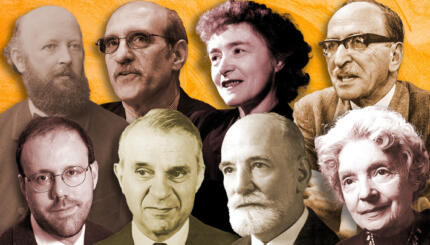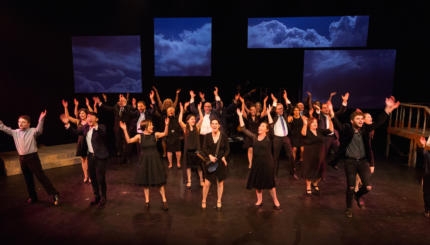This article, written by a journalist in Israel, explores the evolution of Israeli popular music from the days of the pioneers in the pre-State period until today.
The story of Israeli popular music is intimately interwoven with the country’s history and culture. From the young country’s embrace of Zionist folk songs to the blossoming of Middle Eastern-tinged ballads, to the “Israelization” of imported hip hop songs, the music reflects the development and challenges of a young struggling country.
Land of Israel Songs
The earliest genre of Israeli popular music is known as “Shirei Eretz Yisrael,” or “Land of Israel” songs. The poetry and music were written during the 1930s and 1940s, the years leading up to the establishment of the state. The ideology of the nation-in-making centered on pioneering youth reclaiming the ancient land of their forefathers. For this reason, many of the songs included romantic themes about the new and mysterious natural surroundings of the new immigrants. A good example can be found in Natan Alterman’s Shir Ha’amek (Song of the Valley), which is a dark lullaby about Jezerel Valley in the voice of a pioneer. Although the lyrics spoke of building and defending the new land, the actual music was based on the folk music brought by many of the pioneers from Russia.
During Israel’s first two decades of existence, the country found itself perpetually threatened by hostile neighbors, and the Israel Defense Forces, which functioned as the country’s security blanket, was revered by the public. By organizing a handful of military bands whose job it was to travel throughout the country and entertain the troops, the army made a singular contribution in the history of Israeli music.

Help us keep Jewish knowledge accessible to millions of people around the world.
Your donation to My Jewish Learning fuels endless journeys of Jewish discovery. With your help, My Jewish Learning can continue to provide nonstop opportunities for learning, connection and growth.
|
|
|
A CD from the Israeli hip-hop group Subliminal and the Shadow shows a hand gripping a Star of David. |
Adopting the names of the various units, the army entertainment troupe performed tunes that glorified battle and emphasized collective vales of the country like self-sacrifice. The Nahal Entertainment troupe’s “Hora He’achuzut” lionized the farmer-soldiers who set up the agricultural outposts near the country’s frontiers that served as military bases as well. When Israel captured the Sinai in the 1956 war against Egypt, the Nahal troupe performed “Before Mt. Sinai,” a tune that begins with a flourish of trumpets and a proud victory march, proclaiming “it is no dream” that Israel’s army had conquered the Egyptians just like in the Bible.
Songs of Peace and Songs of War
Out of the Six-Day War in 1967 came “Ammunition Hill,” a song in which paratroopers retell the story of the bloodiest battle in the unification of Jerusalem while a frenetic accordion rhythm gives the listener the feeling that they’re alongside the soldiers hopping in the trenches. But the song most often associated with the Six-Day War, “Jerusalem of Gold,” didn’t come out of the military. The song, written by Naomi Shemer and performed by Shuli Natan in the month preceding the war, romanticized the beauty of the city. But when the paratroopers sang the song in the shadow of the Western Wall, it vaulted into Jewish consciousness as an almost liturgical anthem to the liberated capital.
The Six-Day War victory did more than expand the borders of Israel; it opened up the country’s cultural horizons to influences from around the world. In the early 1960s, Prime Minister David Ben Gurion refused to allow the Beatles to visit Israel, fearing the messages brought by rock music would contaminate the minds of Israeli youth. By 1970, young musicians who had been listening to the music for the past decade finally got what they had been waiting for. “Shablool, (snail)”–a collaboration between Arik Einstein and Shalom Hanoch–was rich with the psychedelic effects and humor of the Beatles. The album became the foundation stone of Israel’s homegrown rock scene. Around the same time, Yair Rosenblum and Rotblit wrote the country’s first war protest song. Even though the rest of the country was still intoxicated by the 1967 victory, “Shir L’Shalom” (A Song for Peace) urged listeners to “sing a song for love and not for wars.”
Over the next decade Israeli popular music both imported and exported hits. A Hebrew translation of the Beatles’ “Let it Be” was infused with a new melody and helped propel the singer Chava Alberstein to local fame. Israel joined the annual Eurovision popular song contest. The competition became a showcase for Israel’s most popular young stars, like the group of army buddies “Kaveret” and the singer Shlomo Artzi; Israeli entries won in 1978 and 1979. The second winner was “Hallelujah,” an ecumenical song of praise sung by Gali Atari and a group called Milk and Honey.
Coming Full Circle
As Israelis shed the collectivist national themes from the earlier years, a new anti-establishment trend emerged. For years, the music of the immigrants from the Mediterranean countries and the Middle East was ignored by the Ashkenazic elites, who owned the record companies and filled the roles of music critics. But in the late ’70s, a Yemenite Jewish singer named Argov–who cut his vocal chops in the synagogue of his childhood–was building his popularity from the bottom up. His fame spread through appearances at local community centers and through cassettes sold at Tel Aviv’s rundown Central Bus station.
In 1982, Argov’s crossover hit “The Flower in My Garden” legitimized a new genre – known as “mizrachi,” or “Oriental” music. The music was hugely popular with Israelis hailing from the Middle East, many of whom were from Israel’s the working class. Some intellectuals criticized the lyrics as overly simplistic. But Middle Eastern and Mediterranean melodies and musical motifs continued to be fused with pop and rock by bands like Ethnix and Tipex, resulting in mainstream popular music that now had a uniquely Israeli sound.
The advent of cable television in the early 1990s brought MTV to Israel for the first time, and opened up the country’s youth culture more than ever to the cutting edge of popular music from abroad. From Europe, Israel imported the pulsating electronic techno and transe music popular in clubs. Electronic music became the backing motif of Israel’s third Eurovision victory, in 1997: Viva LaDiva, which was sung by Dana International.
From the U.S., Israeli kids absorbed the rising popularity of hip-hop music from the African American ghettos. Israeli hip-hop rose to popularity just as the dreams of peace symbolized by the 2000 Camp David peace conference disintegrated in the outbreak of the second Intifada. Israeli hip-hop artists took their music in different political directions. Mookie scored the first hip-hop hit by singing an anti-establishment anthem about peace and justice.
But Subliminal and the Shadow released albums praising Israeli strength in the face of adversity and displaying the Star of David on their album cover. As if coming full circle, the patriotic hip hop lyrics had returned the disaffected post-Oslo Accords teenagers to the themes popular with their parents and grandparents 55 years ago, at the birth of the country.



